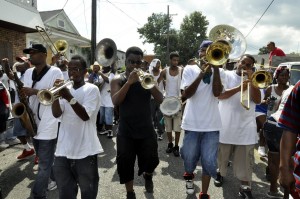Had a visit this week from two young Nederlanders who had made a trip from Memphis to New Orleans on bicycles. Both Leedert and Winifred are in their early thirties, and they love American traditional music. In Memphis, they explored Beale Street, which they didn’t care for (too commercial; too much like Bourbon Street), and also the several museums that Memphis has devoted to music, such as the Stax Museum. They traveled to Helena, Arkansas, home of the (former) King Biscuit Blues Festival, then down to Clarksdale, where they went to the Delta Blues Museum and Morgan Freeman’s club Ground Zero. “We were there two nights, and the first night the music wasn’t so good,” said Winifred, “but the second night there was an open mic and another band that was better.”
From there, the duo cycled to Greenwood, then to Avalon, Mississippi—“nothing but a wide place in the road,” laughed Leendert, “but I wanted to visit because that’s Mississippi John Hurt’s home. There was not much there.” They then cycled to Vicksburg and Natchez (“no music at all, but lots of old homes”). Then to Donaldsonville, Laplace (“the worst of all”), and then on to New Orleans.
The pair arrived last weekend and unfortunately missed the Ponderosa Stomp, but they managed to catch a lot of music on Frenchmen Street.
I put out my usual spiel about us not having anywhere where visitors could get a comprehensive introduction to our musical history (like a museum), and Leendert made an interesting comment: “In Memphis, all the music is in museums; in New Orleans it’s on the streets and you can still experience it.” How astute!
I asked them if they’d seen Treme and they told me they’d downloaded it because there was no European outlet for it to run on television there. The powers that be at their cable station feel that the show is too “inside” for a mass audience. “There are a few times when one of the characters said ‘Play it like Fess.’ Well, unless you know the music like I do, you wouldn’t know Fess or Professor Longhair!”
They told me they felt as though they had lived through an episode of Treme: while attending the second line on Dryades on Sunday afternoon, they heard the gunshots that inadvertently killed a two-year-old baby sitting in a car across from the church on First and Dryades (similar to the episode on Treme when gunshots disbursed the city’s first second line, post-Katrina).
Winifred told me she was shocked because she’d never heard gunshots before. “Everyone was having such a great time,” she said. After that, she said, the fun went out of the day.
I passed on a few recommendations for the rest of their week in New Orleans, and told them to keep in touch, since Leendert is a writer and is doing a piece on the trip for a Dutch magazine, and Winifred is the photographer. I thought it would be a nice idea to hear about their experiences from an outsider’s point of view.
It’s a story that I become used to over the years: people who love, love, love our music with a passion and can’t understand why more people who live here aren’t as passionate about it. And of course, the consternation and fear that comes from random bullets ruining a beautiful experience.
We can bitch, moan, point fingers at the police, the school system, the government, and even the Social Aid & Pleasure Clubs that put on the second lines, but until we can actually do something about the culture of poverty, violence, guns and drugs we don’t have a chance in hell of changing things.
Joseph and I have become hooked on The Wire, another of the Treme creators’ HBO series, which takes place in Baltimore, a city that’s very similar to New Orleans in that it has a large underclass of poor black people, is a very Catholic city, and has significant crime and drug problems. I was talking to one of the producers/writers of Treme and I asked him how New Orleans compared to Baltimore in terms of its drug problem. He told me that in Baltimore a lot of the dealing is on the corners; in New Orleans it’s not so much the corners, but trafficking drugs is a family business, passed down from generation to generation, just like our musical traditions.
It’s such a pity that the sales of drugs have resulted in rampant and unprecedented violence in cities like New Orleans and Baltimore, and indeed in cities all over the country. It may make for great television, but sure can screw up a second-line parade’s enjoyment, and the perception of our city to visitors like Leendert and Winifred.
Mine isn’t a particular popular opinion, but I stand by it: decriminalize drugs. Take dealing out of the hands of street thugs. This policy will go a very long way to stopping violent crime. Stop the violence!





